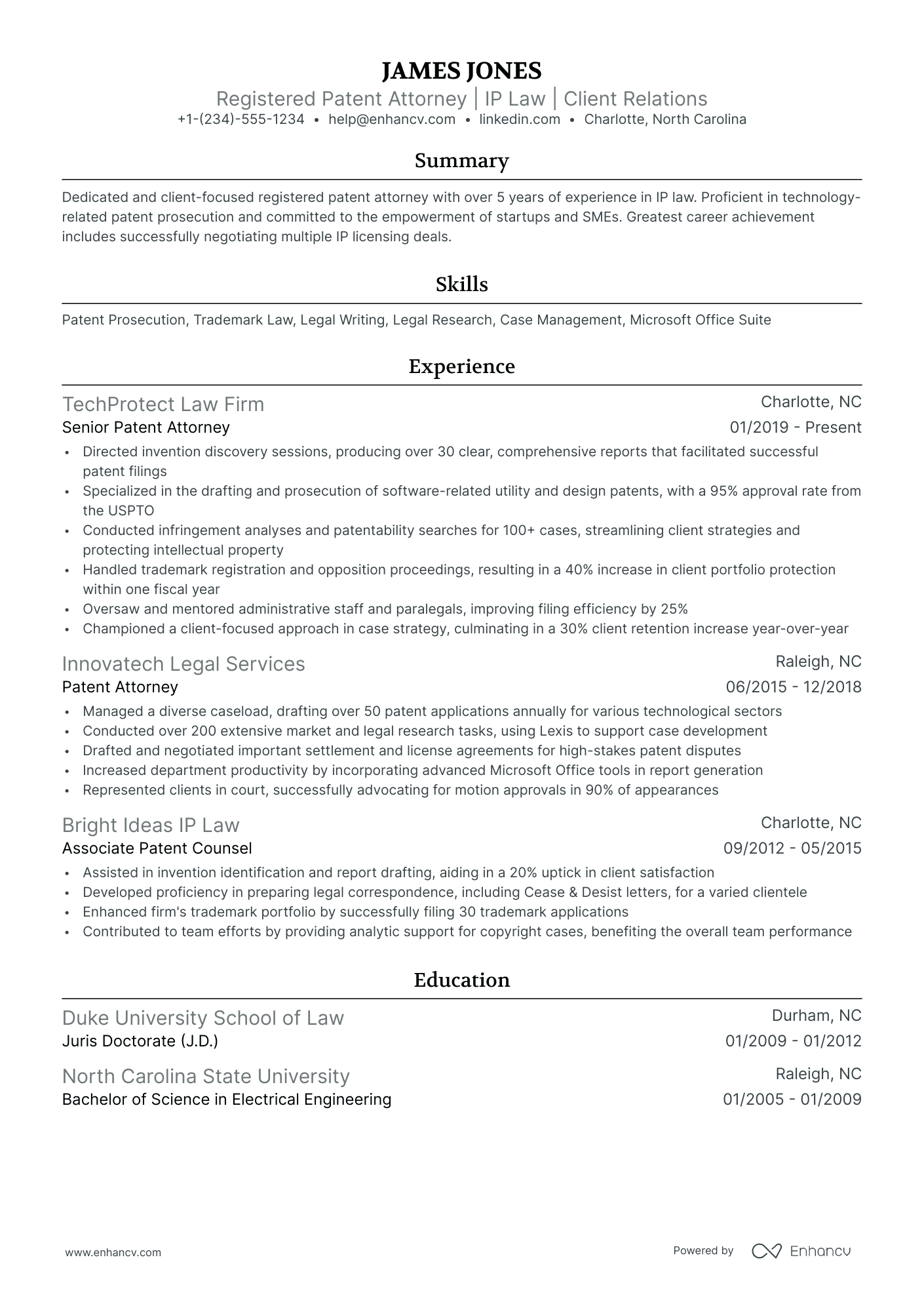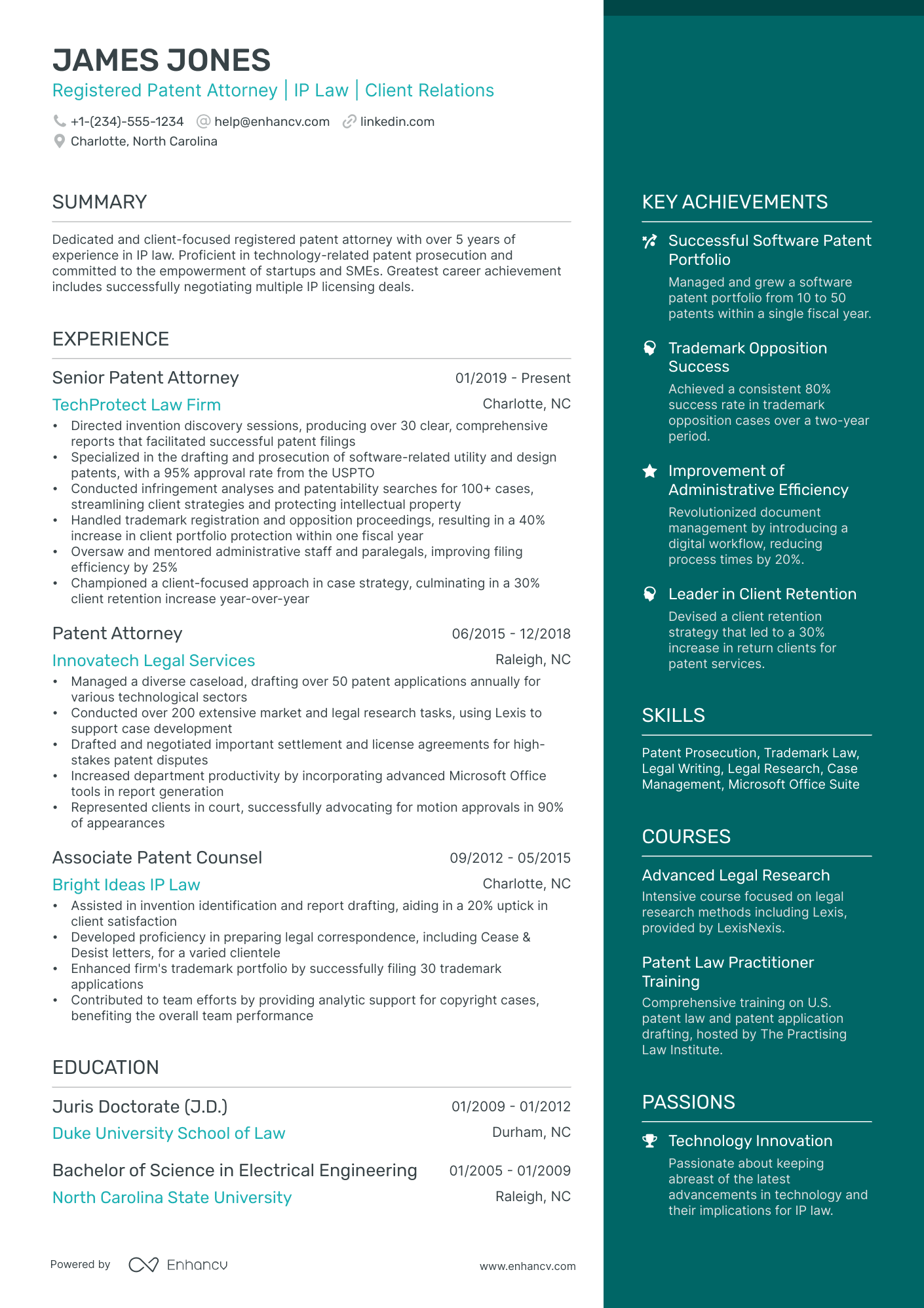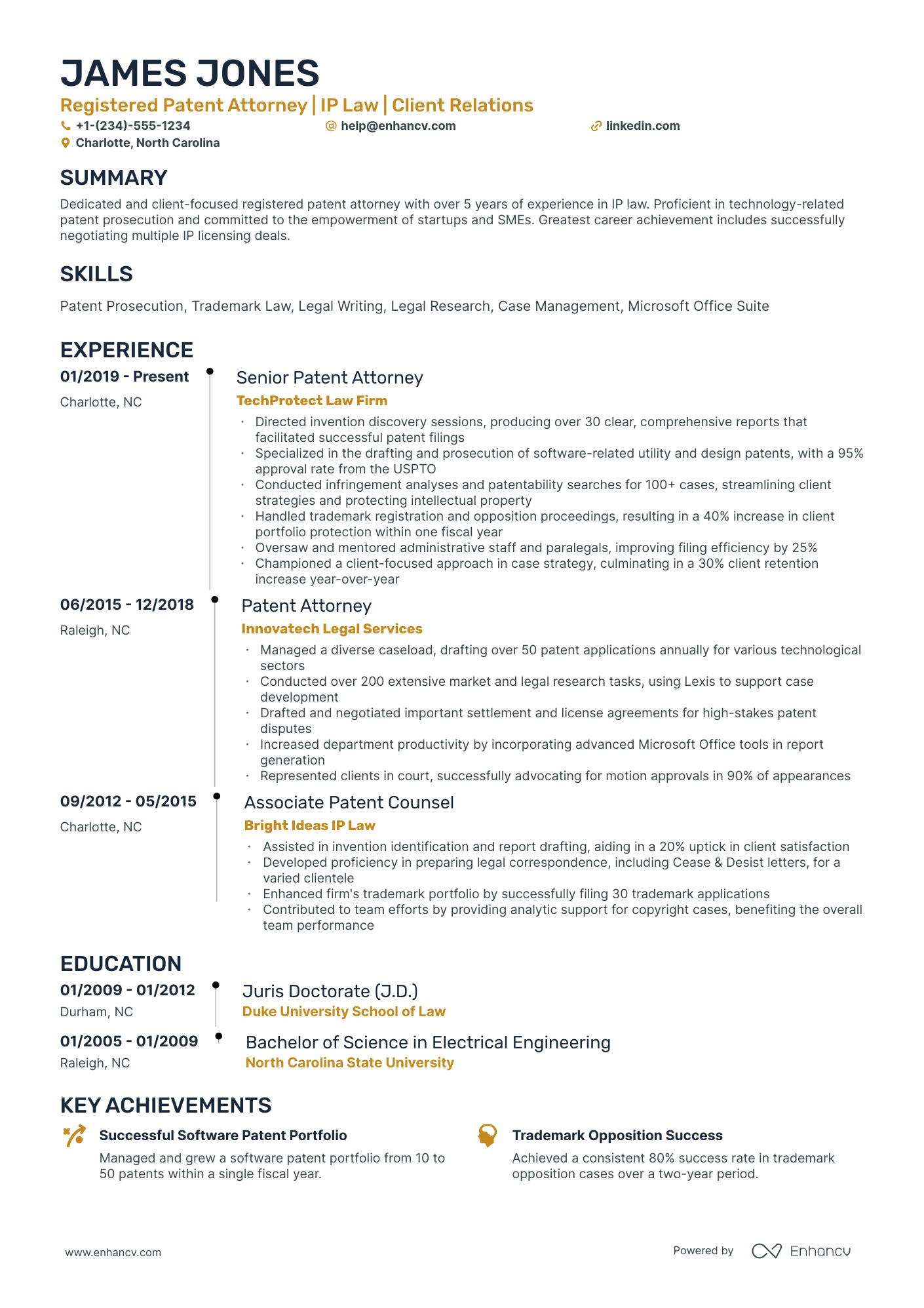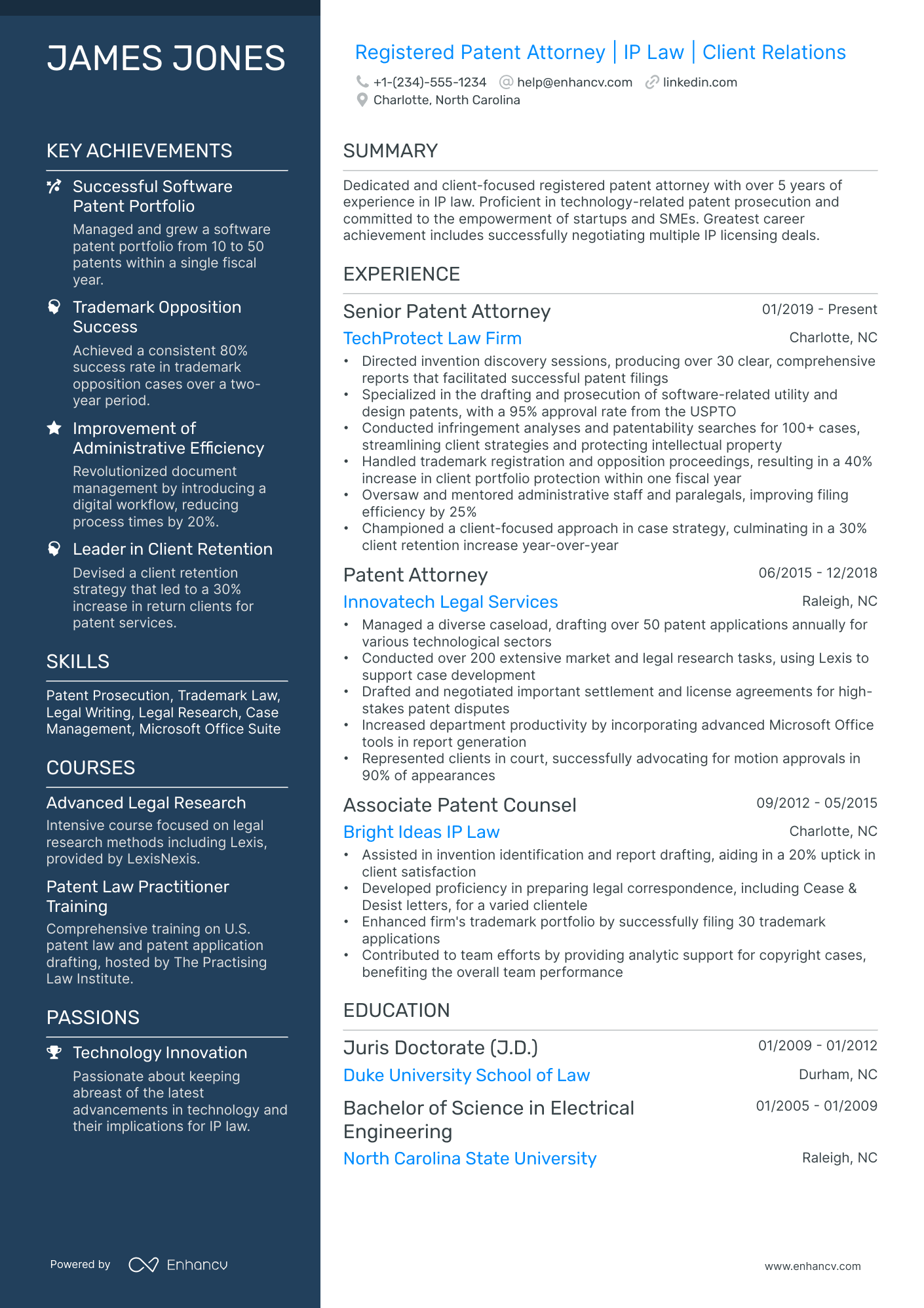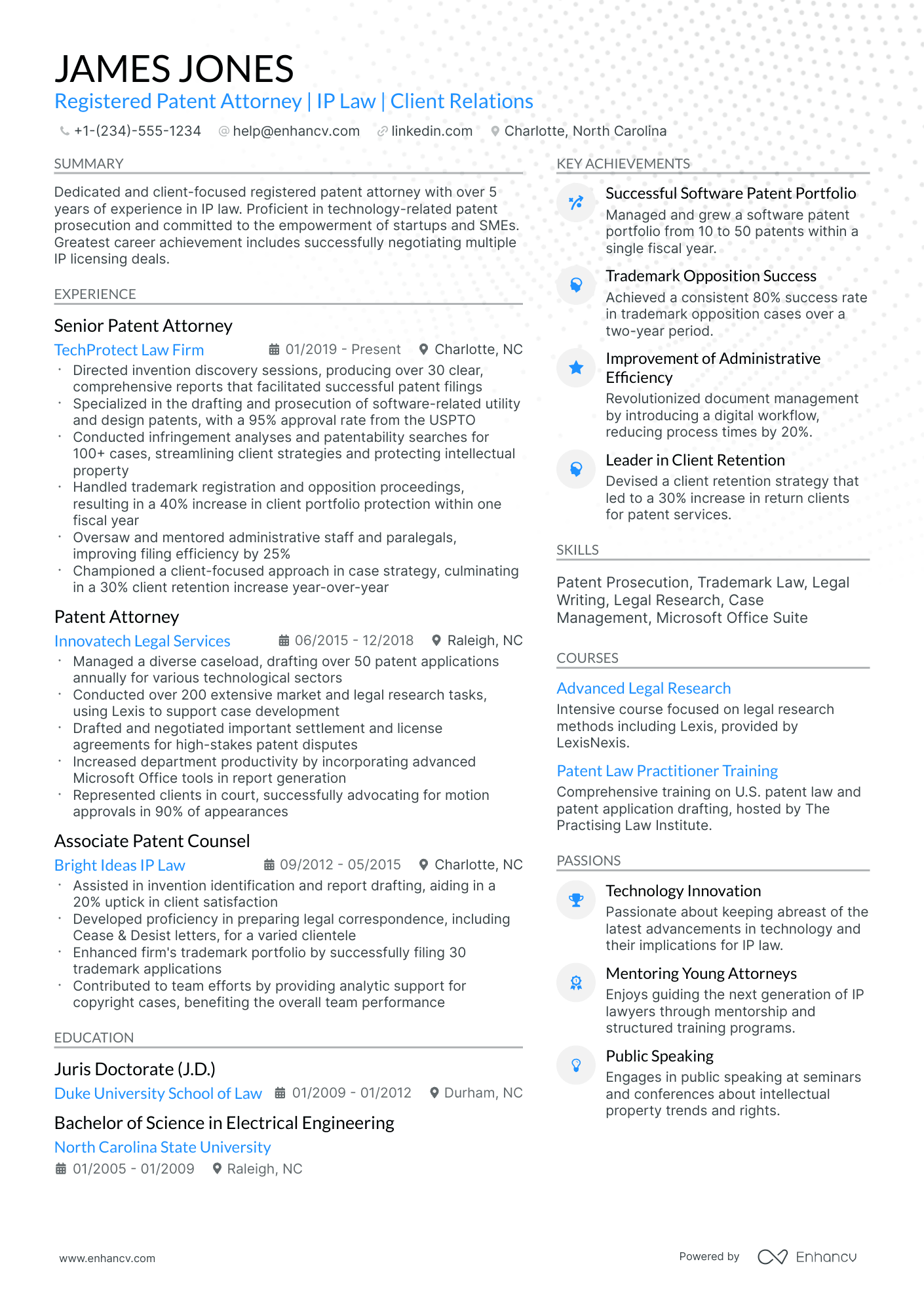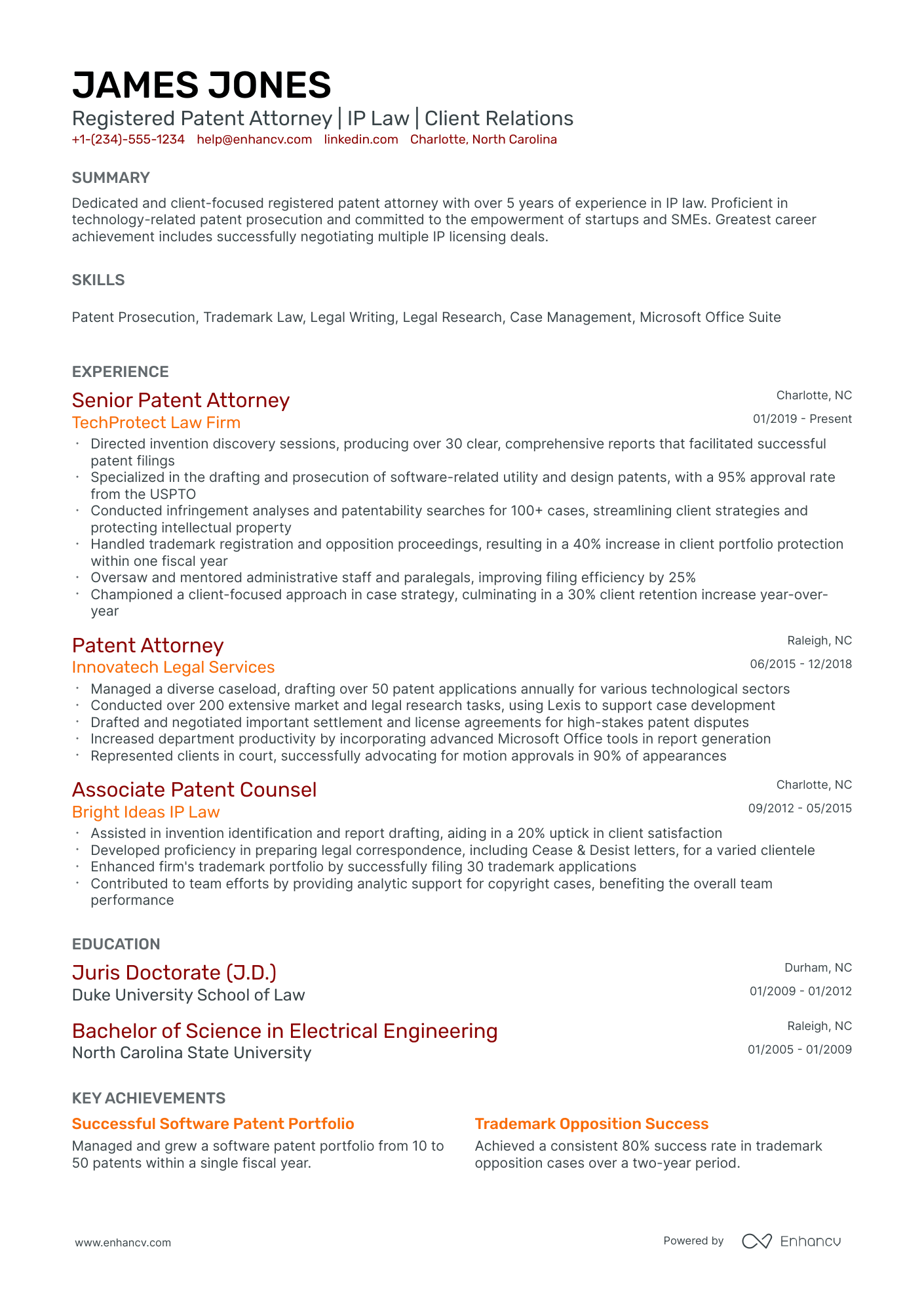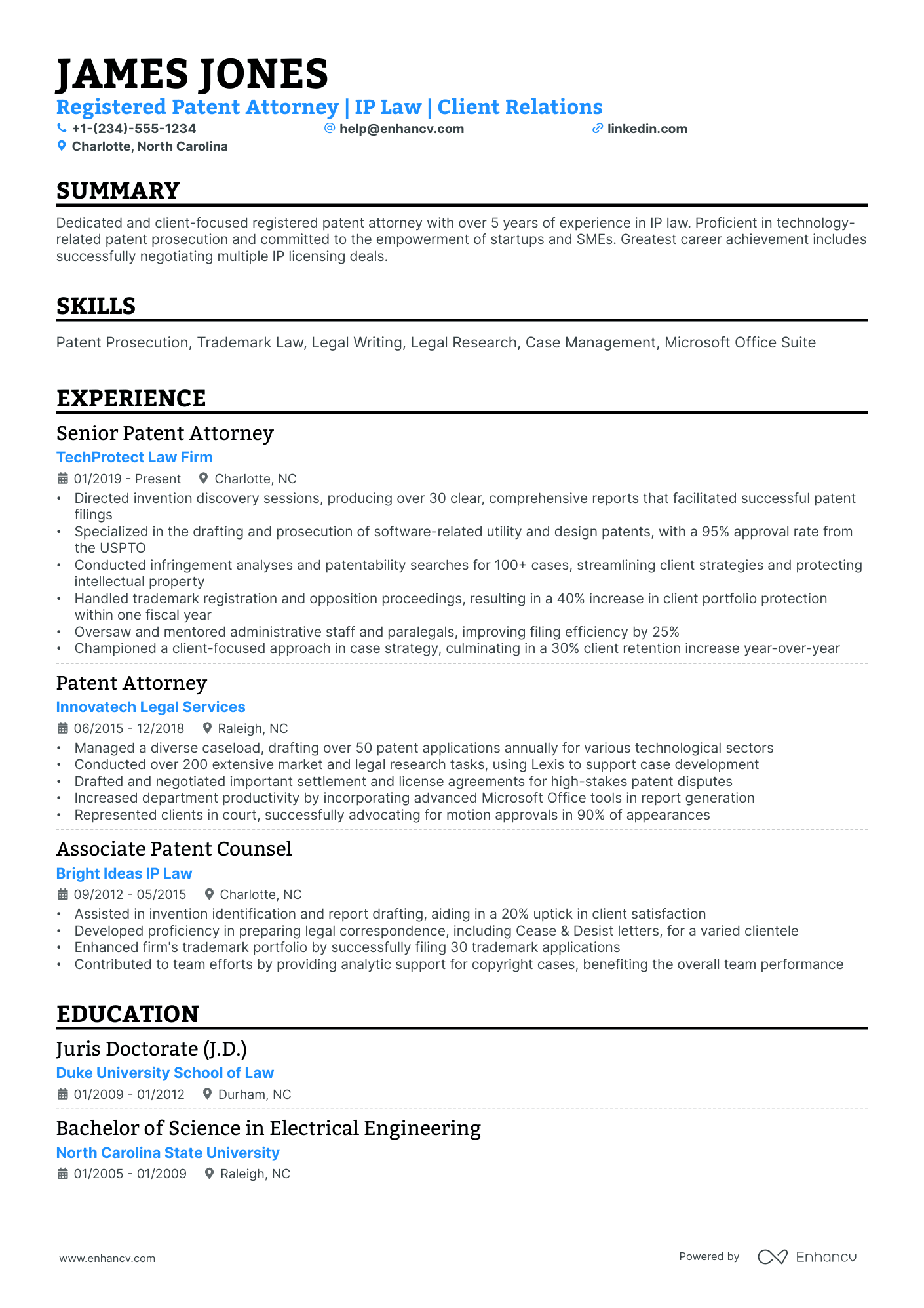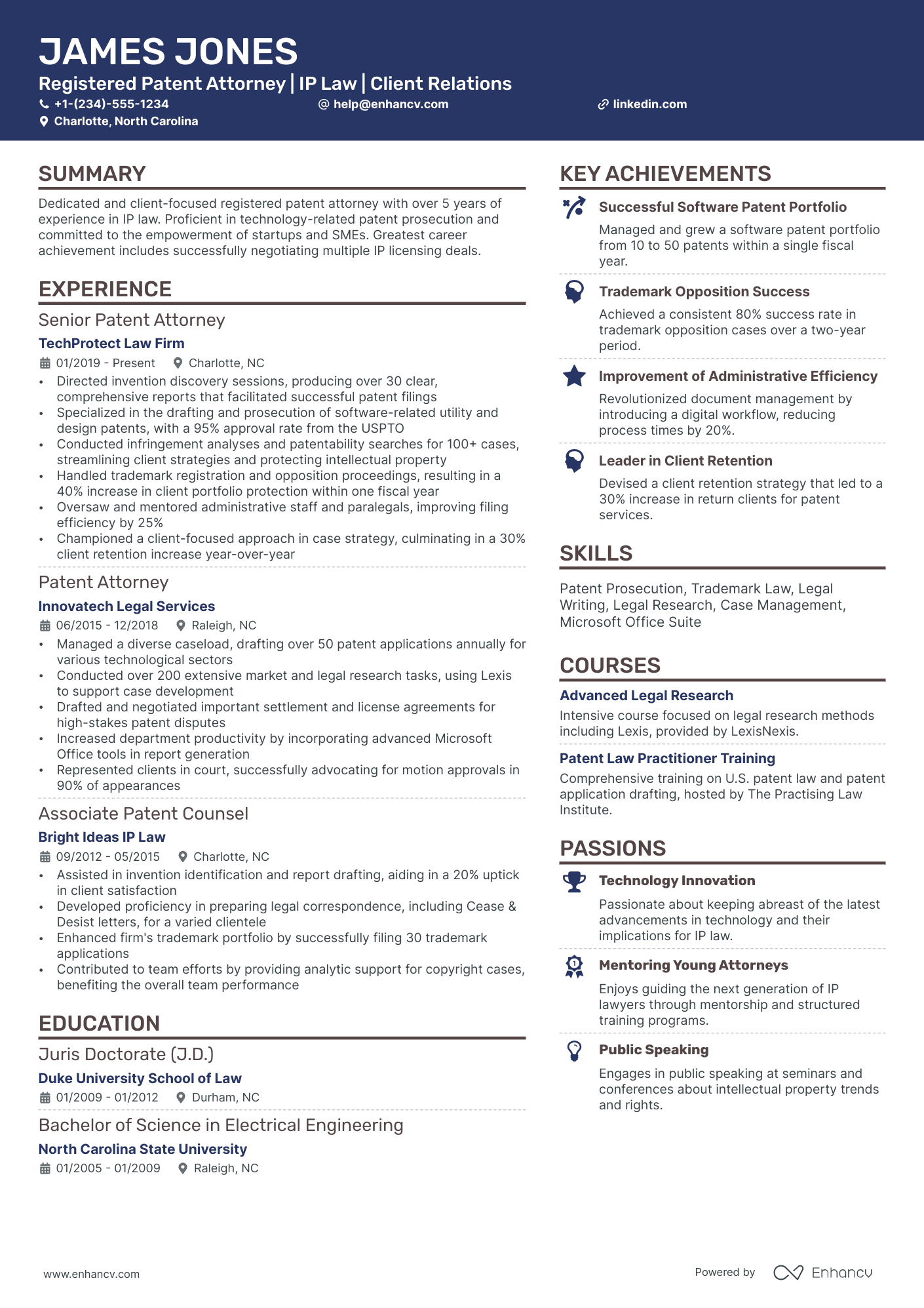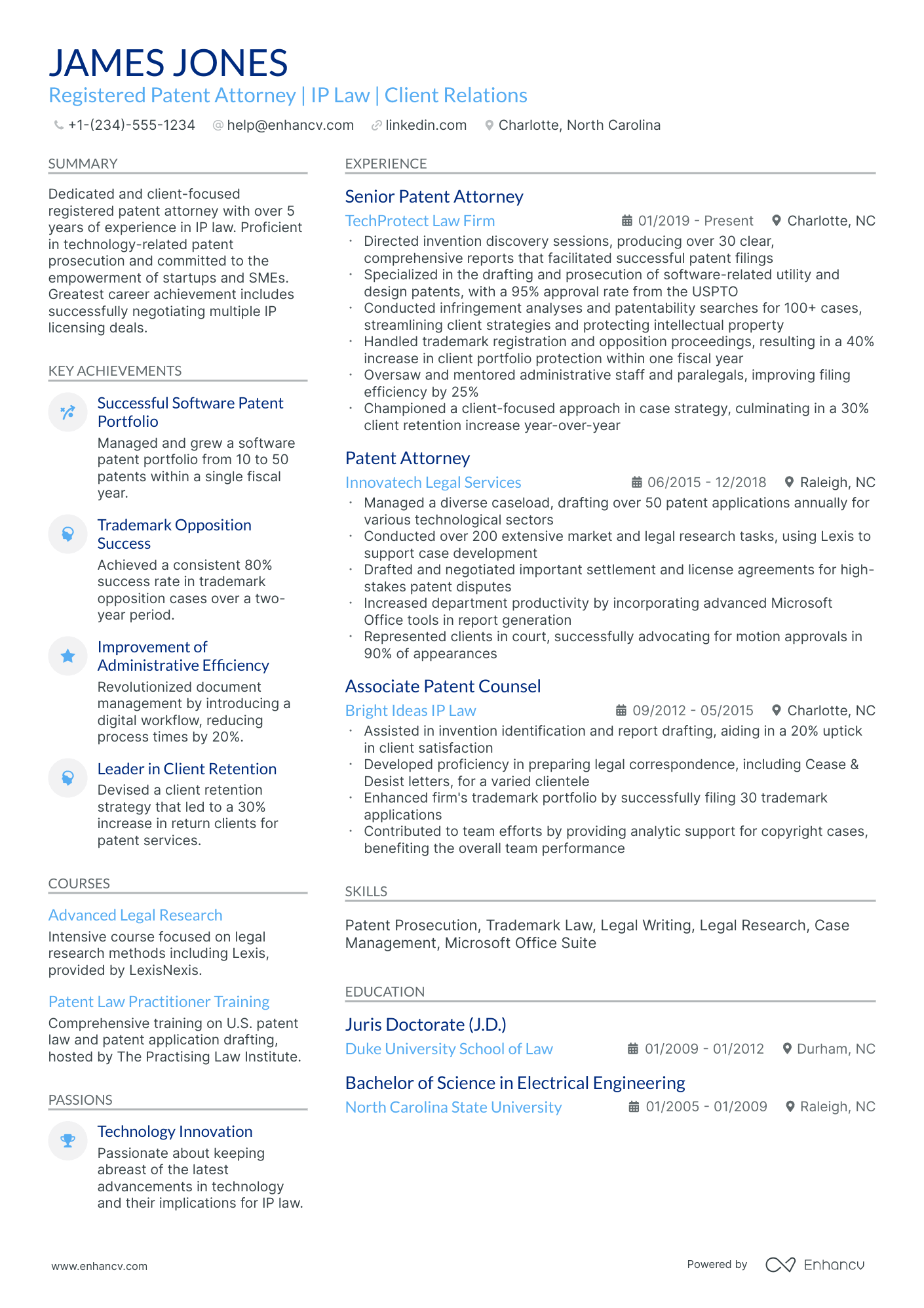As a patent lawyer, you may find it challenging to effectively showcase your specialized technical knowledge and legal expertise on a single-page resume. Our guide provides strategic insights and tailor-made examples to help you concisely present your unique qualifications, ensuring your resume stands out to potential employers.
- Incorporate patent lawyer job advert keywords into key sections of your resume, such as the summary, header, and experience sections;
- Quantify your experience using achievements, certificates, and more in various patent lawyer resume sections;
- Apply practical insights from real-life patent lawyer resume examples to enhance your own profile;
- Choose the most effective patent lawyer resume format to succeed in any evaluation process.
- Personal Injury Lawyer Resume Example
- Trial Lawyer Resume Example
- Employment Lawyer Resume Example
- Criminal Lawyer Resume Example
- Immigration Lawyer Resume Example
- Paralegal Resume Example
- M&A Lawyer Resume Example
- Litigation Lawyer Resume Example
- Real Estate Lawyer Resume Example
- Corporate Lawyer Resume Example
Simple guide to your patent lawyer resume format and layout
Successful patent lawyer resumes all have one specific characteristic - candidates have invested in a simple resume layout . One that is easy to read, makes a good first impression, and is adapted to their professional experience. There are three distinct resume formats to help you focus on your:
- professional experience - use the reverse-chronological resume format;
- skills and achievements - via the functional skill-based resume format;
- both experience and skills - with a hybrid resume format .
What is more, keep in mind that your resume may be initially assessed by the ATS (Applicant Tracker System) (or the software used by companies in the hiring process). The patent lawyer resumes that suit the ATS:
- have a header that includes either a role keyword or the job you're applying for;
- should be no longer than two pages;
- be submitted as PDF, unless specified otherwise.
Adjust your resume layout based on the market – Canadian resumes, for example, may follow a unique format.
Upload & Check Your Resume
Drop your resume here or choose a file. PDF & DOCX only. Max 2MB file size.
PRO TIP
If you happen to have some basic certificates, don't invest too much of your patent lawyer resume real estate in them. Instead, list them within the skills section or as part of your relevant experience. This way you'd ensure you meet all job requirements while dedicating your certificates to only the most in-demand certification across the industry.
The five (plus) definite sections your resume for a patent lawyer job should include are:
- Header with your headline, contact details, and/or a preview of your work
- Summary (or objective) to pinpoint how your success aligns with the role
- Experience with bullets of your most relevant achievements in the field
- Skills to integrate vital job requirements (both technical and personal)
- Your further dedication to the field, showcased via relevant higher education and/or certifications
What recruiters want to see on your resume:
- Demonstrated knowledge and understanding of patent law, including experience with patent prosecution, litigation, and counseling.
- Technical background or degree in a relevant scientific or engineering field that aligns with the area of patent specialization.
- Admission to practice law in at least one jurisdiction and before the United States Patent and Trademark Office (USPTO).
- Strong track record of successful patent applications, transactions, or litigation cases managed.
- Excellent analytical, communication, and client management skills to advise and represent clients effectively in complex patent matters.
Adding your relevant experience to your patent lawyer resume
If you're looking for a way to show recruiters that your expertise is credible, look no further than the resume experience section.
Your patent lawyer resume experience can be best curated in a structured, bulleted list detailing the particulars of your career:
- Always integrate metrics of success - what did you actually achieve in the role?
- Scan the patent lawyer advert for your dream role in search of keywords in the job requirements - feature those all through your past/current experience;
- Dedicate a bullet (or two) to spotlight your technical capabilities and how you're able to use the particular software/technology in your day-to-day roles;
- Write simple by including your responsibility, a job advert keyword or skill, and a tangible outcome of your success;
- Use the experience section to also define the unique value of working with you in the form of soft skills, relevant feedback, and the company culture you best thrive in.
Industry leaders always ensure that their resume experience section offers an enticing glimpse at their expertise, while telling a career narrative. Explore these sample patent lawyer resumes on how to best create your resume experience section.
- Managed the patent portfolio for a leading tech firm, boosting its IP assets by over 30% through the strategic filing of key software patents.
- Negotiated and closed on multiple patent licensing deals with major industry players, resulting in an increase of annual revenue by 25%.
- Conducted in-depth patentability analyses for over 100 potential inventions, effectively reducing R&D costs by 15% through precise IP alignment.
- Led a team of patent associates in drafting and prosecuting patent applications, achieving an 85% issuance rate.
- Designed and implemented a comprehensive IP strategy for emerging technologies, like artificial intelligence, that secured the company's competitive edge.
- Piloted a patent litigation strategy that defended the company against infringement claims, preserving a multi-million-dollar revenue stream.
- Provided expert IP advice for mergers and acquisitions valued at over $500 million, ensuring robust due diligence and seamless IP asset transfer.
- Launched a patent education program for engineers and scientists that tripled the number of high-quality invention disclosures within a year.
- Oversaw the foreign prosecution of patents, expanding the company’s global IP footprint into more than 20 countries.
- Developed and implemented a patent filing strategy that increased the company's patent filings by 40% while maintaining a 90% allowance rate.
- Advised senior management on complex IP-related legal issues, enhancing the company's ability to navigate high-stakes patent litigations.
- Streamlined the patent application process, cutting average prosecution time by six months and reducing costs by 20%.
- Executed a patent monetization strategy, securing licensing deals that grew the patent revenue by 30% annually.
- Orchestrated the defense of key patents in IPR proceedings, resulting in the protection of patents critical to the company's major revenue streams.
- Facilitated the acquisition of strategic patent portfolios, increasing the density of the company’s patent wall and deterring potential litigation.
- Customized intellectual property training programs for R&D teams, which led to a 35% increase in patentable innovations.
- Spearheaded the overhaul of the company's patent filing procedures, introducing efficiency measures that cut processing times by 25%.
- Collaborated with international partners on patent prosecutions, which expanded the company's IP presence into key markets in Asia and Europe.
- Advised on IP strategy which resulted in a 20% year-over-year growth in the firm’s biomedical patent portfolio.
- Interpreted and complied with ever-evolving patent law regulations, ensuring 100% adherence to USPTO and international standards.
- Led due diligence efforts for tech startups, which contributed to informed decision-making for venture capital investments totaling over $100 million.
- Oversaw the preparation and prosecution of over 200 patent applications, maintaining a high allowance rate of 92%.
- Crafted and negotiated IP agreements that secured strategic partnerships with industry leaders, increasing patent portfolio value by 40%.
- Implemented an internal audit system for tracking the lifecycle of IP assets, which reduced maintenance errors by 95%.
Quantifying impact on your resume
- Mention the number of patents you have successfully prosecuted to show your experience and effectiveness.
- Include the percentage of patents that have been upheld in litigation to demonstrate your thoroughness and legal acumen.
- List the dollar amount of licensing deals negotiated on behalf of clients to quantify your business impact.
- Specify the number of patent applications you have worked on in different technological fields to highlight your versatility.
- Detail the number of patent disputes you have been involved in and the success rate to show your litigation prowess.
- Quantify the savings achieved for clients through successful patent strategies or legal advice to demonstrate financial acumen.
- State the number of countries in which you have filed patent applications to show your international experience.
- Itemize the number of client trainings or seminars led on intellectual property matters to emphasize your leadership and communication skills.
Action verbs for your patent lawyer resume
What if you don't have any experience?
There are two very common scenarios about candidates with less experience. They are either:
- Fresh out of college in search of a patent lawyer role
- Transferring over from a completely different field
Both of these types of candidates still have a shot at landing their first job in the industry.
All they need to do about the experience section of their patent lawyer resume is:
- Consider their strengths - would the outcomes of their previous roles or niche skill sets impress recruiters? Feature those towards the top of your resume
- Exclude any and all irrelevant experience items - remember that at the end of the day, you're telling a story that aims to align with the ideal candidate for the patent lawyer job
- Win recruiters over with personality - perhaps your ambition, dreams, and diligence would make you the perfect fit for the patent lawyer role. Dedicate resume space to detail your personality traits by showcasing how they've helped you succeed in past roles
- Tailor your experience to specific job requirements - ensure your patent lawyer resume answers the advert in the best way possible.
Recommended reads:
PRO TIP
If you're in the process of obtaining your certificate or degree, list the expected date you're supposed to graduate or be certified.
The right balance between hard skills and soft skills for your patent lawyer resume
Wondering what the perfect patent lawyer resume looks like? The candidate's profile meets job requirements by balancing both hard skills and soft skills across their resume.
- Hard skills are all the technologies you're apt at using . Prove you have the right technical background by listing key industry hardware/software in your patent lawyer resume skills section and noteworthy certifications.
- Soft skills are both your personal, mindset, communication, analytical, and problem-solving talents . Use your patent lawyer resume achievements section to show how you've used a particular soft skill to reach a tangible outcome.
When writing about your unique skill set, always make sure to refer back to the job advert to see what are the key requirements. This ensures you've tailored your resume so that it matches closer to what the ideal candidate profile is.
Top skills for your patent lawyer resume:
Patent Law
Intellectual Property Management
Legal Research
Contract Drafting
Patent Filing Software
Patent Search Tools
Litigation Support Tools
Case Management Software
Legal Writing
Regulatory Compliance
Analytical Thinking
Attention to Detail
Negotiation Skills
Communication Skills
Problem Solving
Time Management
Interpersonal Skills
Adaptability
Critical Thinking
Team Collaboration
PRO TIP
If the certificate you've obtained is especially vital for the industry or company, include it as part of your name within the resume headline.
Discover the perfect certification and education to list on your patent lawyer resume
Value the insights your resume education section offers. It can shed light on various proficiencies and experiences tailored for the job.
- Add only college or university degrees, stating the institution and duration.
- If you're nearing the end of your degree, note your graduation date.
- Weigh the pros and cons of including unrelated degrees - it might not be your best choice with so little space on your resume.
- Talk about your educational achievements if they amplify your relevant experience.
There are so many certificates you can list on your resume.
Just which ones should make the cut?
- List your prominent higher education degree in a separate box, alongside the name of the institute you've obtained it from and your graduation dates
- Curate only relevant certificates that support your expertise, hard skills, and soft skills
- Certificates that are more niche (and rare) within the industry could be listed closer to the top. Also, this space could be dedicated to more recent certifications you've attained
- Add a description to your certificates or education, only if you deem this could further enhance your chances of showcasing your unique skill set
When listing your certificates, remember that it isn't a case of "the more, the merrier", but rather "the more applicable they are to the industry, the better".
Recruiters have hinted that these are some of the most in-demand certificates for patent lawyer roles across the industry:
The top 5 certifications for your patent lawyer resume:
- Registered Patent Attorney (RPA) - United States Patent and Trademark Office (USPTO)
- Certified Licensing Professional (CLP) - Licensing Executives Society (LES)
- Intellectual Property Law Certificate (IPLC) - Various accredited law schools
- European Qualifying Examination (EQE) - European Patent Office (EPO)
- Patent Cooperation Treaty (PCT) Practitioner Certificate - World Intellectual Property Organization (WIPO) Academy
PRO TIP
List all your relevant higher education degrees within your resume in reverse chronological order (starting with the latest). There are cases when your PhD in a particular field could help you stand apart from other candidates.
Recommended reads:
Professional summary or objective for your patent lawyer resume
patent lawyer candidates sometimes get confused between the difference of a resume summary and a resume objective.
Which one should you be using?
Remember that the:
- Resume objective has more to do with your dreams and goals for your career. Within it, you have the opportunity to showcase to recruiters why your application is an important one and, at the same time, help them imagine what your impact on the role, team, and company would be.
- Resume summary should recount key achievements, tailored for the role, through your career. Allowing recruiters to quickly scan and understand the breadth of your patent lawyer expertise.
The resume objectives are always an excellent choice for candidates starting off their career, while the resume summary is more fitting for experienced candidates.
No matter if you chose a summary or objective, get some extra inspiration from real-world professional patent lawyer resumes:
Resume summaries for a patent lawyer job
- Seasoned patent lawyer with over 15 years of experience specializing in biotechnology patent prosecution and intellectual property litigation. Demonstrates a proven track record of securing patent protections for complex genetic engineering inventions, contributing to the advancement of industry-leading biotech firms. Expert in navigating the USPTO's rigorous application process and successfully overturning prior art rejections to safeguard clients’ innovations.
- Distinguished patent attorney with a decade at the forefront of aerospace technology protection. Skilled in international patent portfolio management and enforcement, with a particular knack for resolving infringement disputes. Negotiated landmark licensing deals on behalf of a Fortune 500 aviation company that resulted in profitable partnerships and long-term innovation advancement.
- Accomplished software engineer and recent law school graduate keen on leveraging an extensive 8-year background in software development towards specializing in technology patent law. Enthusiastically pursuing application of deep technical knowledge to assist inventors in securing IP rights, with a focus on artificial intelligence and machine learning advancements.
- Dynamic chemist transitioning into the legal realm, bringing forth 7 years of pharmaceutical industry experience and a fresh JD degree. Aiming to combine in-depth scientific expertise with newfound legal acumen to facilitate effective patent strategies and contribute to the intellectual property protection of cutting-edge pharmaceuticals and novel medical treatments.
- Eager to embark on a professional journey in patent law, utilizing a recent law degree from a top university and a passion for clean energy technologies. Dedicated to supporting the next generation of sustainable innovations by providing robust legal frameworks for intellectual property protection, and aspiring to become an integral part of a legal team safeguarding green technology advancements.
- Aspiring patent lawyer with a strong engineering background seeking to apply a Master’s degree in Mechanical Engineering and newly-minted JD to the defense of intellectual property rights. With a particular interest in supporting inventors within the renewable energy sector, eagerly pursuing opportunities to contribute to the protection of technological innovations that drive environmental sustainability and growth.
Optimize your resume summary and objective for ATS
Drop your resume here or choose a file.
PDF & DOCX only. Max 2MB file size.
What else can you add to your patent lawyer resume
What most candidates don't realize is that their patent lawyer resumes should be tailored both for the job and their own skillset and personality.
To achieve this balance between professional and personal traits, you can add various other sections across your resume.
Your potential employers may be impressed by your:
- Awards - spotlight any industry-specific achievements and recognitions that have paved your path to success;
- Languages - dedicate some space on your patent lawyer resume to list your multilingual capabilities, alongside your proficiency level;
- Publications - with links and descriptions to both professional and academic ones, relevant to the role;
- Your prioritization framework - include a "My Time" pie chart, that shows how you spend your at-work and free time, would serve to further backup your organization skill set.
Key takeaways
- Ensure your patent lawyer resume uses a simple, easy-to-read format that reflects upon your experience and aligns with the role;
- Be specific within the top one-third of your resume (header and summary or objective) to pinpoint what makes you the ideal candidate for the patent lawyer role;
- Curate information that is tailored to the job by detailing skills, achievements, and actual outcomes of your efforts;
- List your certifications and technical capabilities to demonstrate your aptitude with specific software and technologies;
- The sections you decide on including on your patent lawyer should pinpoint your professional expertise and personality.
